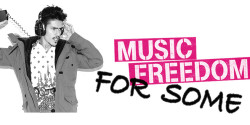Here at Radio Survivor we’ve discussed how an internet fast lane might negatively affect internet radio, especially mobile internet radio. But we weren’t expecting it to actually happen so quickly.
What I’m talking about is T-Mobile’s announcement on Wednesday that the company will allow customers to stream music to their smartphones without it impacting their data plans. That’s part of its bid to be the “Un-Carrier,” that treats its customers better than the likes of AT&T and Verizon.
At first blush this sounds great, doesn’t it? So what’s the catch?
The catch is that the free data is only for major streaming services like Pandora, Spotify, iTunes Radio, iHeartRadio, Slacker, Rhapsody and Samsung’s Milk Music. The problem is what’s not included.
Not included are college and community stations, thousands of independent internet stations, and independent music and audio services like Bandcamp and Soundcloud. Even some bigger music services like Rdio, Beats and Google Play are not yet part of the plan.
This means that platforms like Pandora and iHeartRadio have a big advantage in reaching T-Mobile customers compared to a WFMU or plug.dj. As the Future of Music Coalition points out, it also means that musicians who aren’t on Spotify or Pandora are also at a disadvantage. For all intents and purposes, T-Mobile customers will pay a tax if they want to listen to music or stations that aren’t part of the so-called “Music Freedom” plan.
Benign Discrimination Is Still Discrimination
Now, I don’t think it is T-Mobile’s intent to exclude music services, streaming stations and musical artists. In part, there are simple practical issues behind the inclusion and exclusion. It’s actually not easy for T-Mobile to know for sure that a customer’s data stream is music or radio, except by seeing where the data is coming from. In order to give a free ride to all streaming music or radio would require the company to have a very good index of all the services out there. But by first going with the most popular services they solve a big chunk of that problem.
Further demonstrating a likely benign intent, T-Mobile is letting customers vote on which services are added to the free data plan next. However, it’s not a write-in vote, and only bigger services like Rdio and Soundcloud are included on the current ballot. That leaves out a boatload of smaller services and stations that aren’t as well known.
Still, no matter how well-intentioned, benign discrimination is discrimination.
Complicating the picture a little more is that T-Mobile also announced its own streaming music service called unRadio, the product of a partnership with Rhapsody. Not unexpectedly, that service is part of “Music Freedom,” too.
unRadio is not an on-demand service like full Rhapsody. Instead it’s a Pandora-style radio stream based on custom stations, but with unlimited skips, as well as no commercials. UnRadio is free for T-Mobile customers with Simple Choice data plans and subscribers to Rhapsody’s full on-demand service. It’s $4.99 a month for all other T-Mobile customers.
unRadio does promise to offer live streaming radio from “thousands of terrestrial stations.” It names KCRW in Los Angeles, KEXP in Seattle, and Chicago’s WXRT as few of them. Now, we don’t know what the other stations are, nor how they are selected. For what it’s worth KCRW and KEXP are both on iHeartRadio, which is part of the “Music Freedom” plan. WXRT is from Clear Channel competitor CBS Radio, which offers its own Radio.com service.
In highlighting a couple of well-respected non-commercial stations we again see an attempt to be inclusive. Yet that only begs the question as to what stations will not be included.
Even if T-Mobile includes the stream of every terrestrial station in the US, that still leaves out an awful lot of radio that’s on the internet. International and internet-only stations don’t fit that bill, for example.
Molehill or Snowball?
I know this can seem like I’m making a mountain out of a molehill. T-Mobile is the #4 carrier in the US, so this affects far fewer people than if it were AT&T or Verizon. Plus, in many ways the “Music Freedom” plan is a net gain for customers, who get to listen to a whole lot of music without using up their data plans or incurring overage charges.
Plainly speaking, the problem still is that some internet music services and stations get a toll-free fast-lane on T-Mobile’s mobile internet, while others do not.
Rather than molehill, it’s really a snowball that threatens to avalanche. Imagine if AT&T and Verizon were to try to match T-Mobile at this game. That would put small and independent services at an even greater disadvantage with regard to reaching most of the country’s mobile listeners.
At the moment, this is all legal. It would also be legit under the FCC’s current Open Internet proposals, too. That’s why it’s important for those who care about a level playing field for all internet services–including music and radio–should send comments to the FCC.
If T-Mobile really wants to give its customers a gift, maybe it should just remove data caps altogether. That would be truly “UnCarrier” thing to do.



